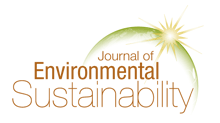Creative Commons License

This work is licensed under a Creative Commons Attribution 4.0 International License.
Abstract
Peri-urban residential settlements in Nigerian cities grew phenomenally as a result of rapid urbanisation. But the spontaneous housing settlements are enmeshed in development-driven urban challenges. This study examines the environmental sustainability of a typical peri-urban settlement in Lagos, Ikorodu. A combination of case study based examination and application of International Urban Sustainability Indicators List framework (IUSIL) was used to achieve an integrated research method. Data were collected through primary and secondary sources including observation, structured questionnaires, interview and satellite images. Two stage clusters sampling was used to select 384 household heads as the study population. Quantitative data was done using descriptive analysis while satellite image analysis was used for qualitative data. Investigations were carried out on the state of infrastructure, locational quality and the commuting pattern. Findings show fair environmental sustainability as evidenced by access to public water services, effective transportation system. There was residents’ satisfaction in areas of fresh water, less reliance on automobile and effective transportation system which culminates in less commuting hours in the study area. Dissatisfaction was recorded over inadequate drainage system, poor waste management, resulting in poor environmental quality. Also noted was deviation from the master plan, zoning was not adhered to thereby causing noise pollution due to encroachment of manufacturing industries on residential areas. These findings can be a useful template for all stakeholders in enabling sustainability of emerging settlements in Lagos cities’ periphery.
Recommended Citation
Adedire, Funmilayo Mokunfayo Dr. and Adegbile, Michael Babatunde Dr
(2021)
"Environmental Sustainability In Lagos Periphery Housing,"
Journal of Environmental Sustainability: Vol. 8:
Iss.
1, Article 1.
Available at:
https://repository.rit.edu/jes/vol8/iss1/1
